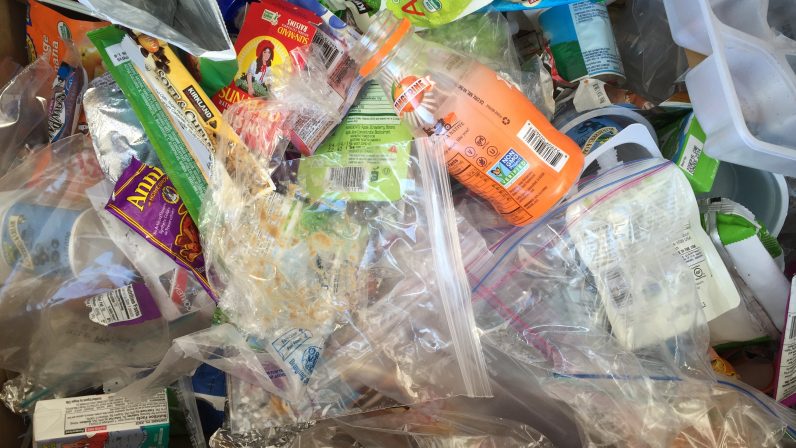We’re talking trash at the Seed these days. Last week we collected the lunch trash for five days and I’m happy to announce that the entire accumulation fit in a smallish box. You’ll be seeing a display of it in the coming days to further awareness of why it’s a good idea to utilize reusable containers. In addition to collecting lunch trash, we’ve had several lively discussions about plastic, particularly one-time use plastic bags and plastic water bottles, and their impact on the ocean. This video fueled the conversation: (https://vimeo.com/100694882).
The first and second graders have been talking plastic, too. Their April Scholastic News features a cover photo of a plastic bag floating in the ocean looking eerily like a jellyfish. They’ve been learning how problematic this is for sea turtles, who can’t easily distinguish between plastic bags and jellyfish. One of the second grade girls shared this spontaneous writing with me, titled “Earth Problem”: “The world is so incredibly bad with plastic. When people get a toy or something and the bag that the toy is in, some people just drop it and it goes in the ocean and sea creatures eat it and then it dies and if it is a fish, people eat the fish and then the people get sick and sometimes die. And no more littering ever again!”
That same child, along with a classmate, took the initiative to pick up trash from the playground. They decided they’d keep track of what they found all week and then make a statement about it. I love how they are using writing, science and mathematics to further their social activism. Social activism isn’t limited to the older children. In response to our talk about plastic bags, one teacher shared a story of her three-year-old daughter who went shopping with her grandmother. When the grandma took plastic bags for her groceries, the child said, “We can’t use these bags. They hurt the Earf.”
As I researched plastics in the ocean, I learned that the average American uses 167 disposable water bottles every year (http://www.banthebottle.net/bottled-water-facts/). It is estimated that only 38 of those 167 are recycled. That means 129 go in the trash. I also read that “5 trillion plastic bags are produced yearly. Side by side, they can encircle the world 7 times.” Only 1 to 3% of them are recycled. (http://www.theworldcounts.com/stories/interesting-facts-about-plastic-bags) These facts and lists of other facts from which they come are alarming to say the least. It’s a problem that won’t go away without our help. We will continue to make it part of our curriculum and our daily practices to reduce the use of plastics and increase awareness about recycling. This is about the quality of our future and our children’s futures. If we don’t take this on to help heal our planet, who will?

